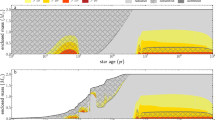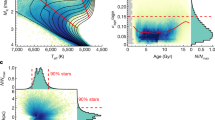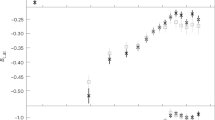Abstract
PROF. GAMOW appears to agree with our view that accretion of hydrogen by the stars from the cosmical cloud would be important if the rate were sufficiently rapid to compensate the transmutation of hydrogen within the stars. He believes, however, that the accretion rate is too low for this to be happening in the case of a typical giant by a factor of order 104. Since the publication of our initial paper1 on this problem, we have been able to proceed further with the discussion of the physical aspects of the process, and we have been able to show that in reality the difficulty mentioned by Prof. Gamow does not arise.
This is a preview of subscription content, access via your institution
Access options
Subscribe to this journal
Receive 51 print issues and online access
$199.00 per year
only $3.90 per issue
Buy this article
- Purchase on Springer Link
- Instant access to full article PDF
Prices may be subject to local taxes which are calculated during checkout
Similar content being viewed by others
References
Hoyle and Lyttleton, Proc. Camb. Phil. Soc., 35, 405, 592 (1939).
Camm, Mon. Not. Roy. Astro. Soc., 100, 45 (1939).
In course of publication.
Author information
Authors and Affiliations
Rights and permissions
About this article
Cite this article
LYTTLETON, R., HOYLE, F. The Evolution of the Stars. Nature 146, 97–98 (1940). https://doi.org/10.1038/146097b0
Issue Date:
DOI: https://doi.org/10.1038/146097b0
Comments
By submitting a comment you agree to abide by our Terms and Community Guidelines. If you find something abusive or that does not comply with our terms or guidelines please flag it as inappropriate.



